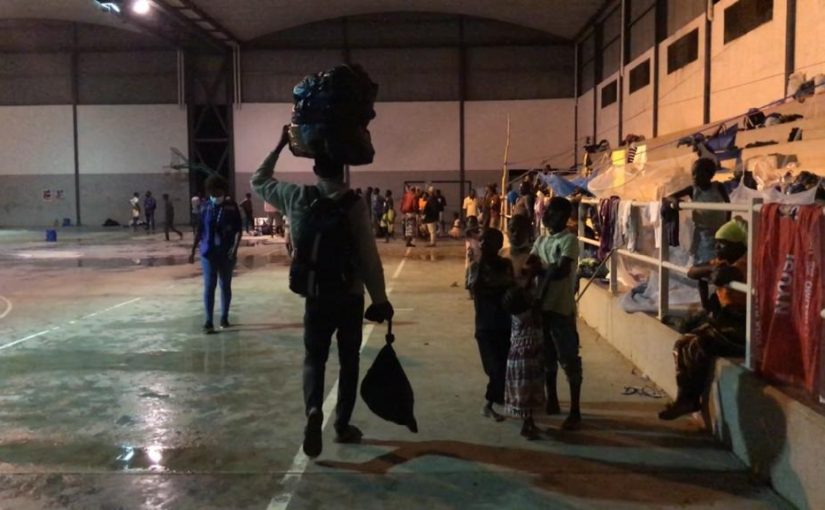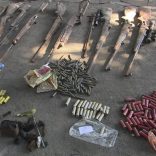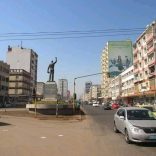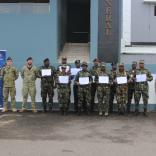Mozambique: Cache of rusted weapons found in a Maputo building - Watch
Mozambique: Palma 20,000 displaced and fear; drug trade has left war zone – By Joseph Hanlon

FFILE - For illustration purposes only. The Pemba sports centre which was converted into a transit centre for displaced persons, photographed on April 14 2021. [File photo: Twitter / @IOM_Mozambique]
- In this issue
- Palma
- 11,104 camped at Afungi with no food
- Residents fear soldiers & want to leave
- Total-contractors confrontation
- Other Cabo Delgado news
- Cyclone Jobo
- Collusion with insurgents
- Drugs
- Drugs no longer pass through war zone
- Corruption
- FT: Credit Suisse failed to manage risk
- 1,104 camped at the gate of Afungi with no relief aid
UN Migration (IOM) said 11,104 displaced people are camped at the Quitunda primary school. Most have walked to flee the fighting. Quitunda is the resettlement village just outside the gate of the Afungi Peninsula construction site recently abandoned by Total, and now in control of the Mozambican army. Other sources say this is just the number at the school and there are 20,000 displaced people at Quitunda.
World Food Programme (WFP) says “there are people in urgent need of humanitarian assistance in Palma, Quitunda and Afungi.” But it says it cannot help because there are not yet “safe humanitarian channels to be able to provide life-saving assistance for people in those affected areas.”
There are no longer insurgents in the area, so the only security issue must be the defence forces (FDS). The key phrase is “safe humanitarian channels”. Food and other assistance would have to land at the Afungi airstrip, and apparently once it is taken off the plane the FDS takes control of it. This is not considered acceptable by UN agencies, and the stalemate has lasted more than a week.
20,558 people displaced from Palma had registered with IOM by 16 April. These are people now outside Palma district and do not include the 11,104 or 20,000 in Quitunda as well as those elsewhere in Palma district. Most of the displaced are in Mueda (6,594), Nangade (5,401), Pemba (3,901) and Montepuez (3,347). IOM estimates that 65% travelled by bus; 75% are living within host communities.
714,136 people are registered as displaced by the Cabo Delgado civil war. This includes those still in Palma, said spokesperson Filimao Suaze after the Council of Ministers meeting Tuesday (20 Apr)
- Residents fear soldiers & want to leave Palma
“Locals now fear the security forces as much as they feared the insurgents”; they feel it is too dangerous to stay and want to flee, reports Zitamar (21 April)
“Defence and Security Forces (FDS) are carrying out ‘manhunts’. It is a highly charged action seen as both vengeful and nervous, that often results in the suspicion, accusation and murder of innocent people. When three young men were found dead on Monday morning in Palma, it is suspected that they were killed by elements of the FDS, accused of being part of terrorist groups,” writes MediaFax (21 April)
“The persecution and vengeance that drives the actions of the FDS in Palma is one reason why many people are looking for ways to leave the town, at a time when the climate of trust between the population and government forces seems to be starting to deteriorate. Local sources report a real fear by the local population, both of a new terrorist attack, and of the risk of falling under the suspicion of the FDS. It is enough to be suspected to be in danger of being killed by government forces,” writes Mediafax.
It appears that people are not being allowed to leave Palma or Quitunda.
Soldiers and police are colluding with the insurgents, Mozambican Police Association president Nazario Muanambane admitted on 17 April. This was also reported in Dossiers & Factos (5 April), for example telling the insurgents when supplies had arrived. The newspaper quoted a soldier: “At the time of the insurgent assaults on military positions in Quionga and Nangade, for example, the border police unit had just been supplied. The enemy attack came exactly two days later. We were waiting for dinner, which would be at 17.00 hours. It was around 16.30 when the insurgents chanted the famous Allahu Akbar. All the troops fled.”
- Confrontation between Total and contractors
Total will not pay subcontractors and is refusing to allow contractors to remove equipment from Afungi. There have been two meetings between Total, the French embassy and the business association CTA. Total says it has no outstanding debts to its contractors, and contractors are responsible to pay subcontractors – many of which are Mozambican SMEs (small and medium enterprises) which Total claimed to be promoting. A joint task force will be set up to resolve the problems. (Carta de Mocambique, MediaFax 21 Apr)
Total also stressed that it has only suspended the project and thus relations with contractors are also only suspended. Thus under their agreements, contractors are not allowed to remove their equipment from Afungi. But Total has abandoned Afungi to the Mozambican defence and security forces (FDS) which have been looting contractor compounds in Palma, so contractors fear their equipment on Afungi is not safe.
- Other Cabo Delgado news
Tropical storm Jobo could bring heavy rain and strong winds to Palma, Nangade and Mocimboa da Praia districts at the weekend, warns INAM (Instituto Nacional de Meteorologia). The storm was north of Madagascar this morning (21 Apr), predicted to become a cyclone on 22 April and hit the coast of Tanzania Saturday (23 Apr). INAM say this will bring heavy rain and wind to coastal areas south of the Rovuma river. There is a twice-daily updated cyclone map on http://www.meteo.fr/temps/domtom/La_Reunion/webcmrs9.0/anglais/index.html
There are rainfall predictions on windy.com.
Insurgent attacks have destroyed 104 schools in Cabo Delgado, Provincial Education representative Manuel Bacar told a webinar 15 April. A further 194 schools in Cabo Delgado could not start the 2021 school year because of the lack of security. There are 900 schools in the province.
The SADC technical commission arrived on 15 April. It is looking at possible military support and must report back to SADC leaders on 29 April.
- Take your choice:
“Some analysts have questioned the purported links between the insurgents in Cabo Delgado province and the Islamic State group, with suggestions that foreign powers have an interest in promoting such links to justify military intervention.” Radio France International (17 Apr) https://www.rfi.fr/en/africa/20210417-fresh-clashes-in-mozambique-s-restive-cabo-delgado-province-islamist-palma
“Known as Iscap, the swelling band of Congo- and Mozambique-based militants once fighting for autonomy from the central government has this year become one of the terror group’s deadliest franchises” Wall Street Journal (Apr 15) https://www.wsj.com/articles/islamic-state-seeks-revival-in-christian-countries-11618498283
$58.9 mn in rubies were sold by Gemfields at a series of auctions in March. The rubies were mined before it suspended operations at its Montepuez Ruby Mine in April 2020 due to Covid-19. It hopes to reopen its mine later this month.
- Drugs
- Recent seizures show drugs no longer pass through war zone
The United States and others continue to link the insurgency and Islamic State to the drug trade. Instead, just the opposite has happened. The insurgency has pushed the drug trade out of Cabo Delgado and south to Nampula and even Zambezia.
This is not ideological, but logistic. Heroin and now crystal meth are made in Afghanistan, taken overland to the Makran coast, shipped by dhow to the Mozambique coast, then taken by road to Johannesburg, and put in containers to send to Europe. The drugs were previously dropped along the Cabo Delgado coast, but the insurgents have closed the roads there, so the drops have moved south.
A dhow can carry up to a tonne of secret cargo. Usually the dhows stop 30-40 km off the coast, and the drugs (and other illegal cargoes) are divided up into smaller quantities and taken ashore by fishing boats. The cargoes are just dropped on the beach at an assigned place.
The beaches around Nacala seem to have become an important drop zone. On 23 March police seized 365 kg of heroin and methamphetamine in rucksacks in a Ford truck on the beach. Police believe that the drugs came ashore in small boats, and when the traffickers realised the police were closing in, they abandoned the drugs and truck and escaped by sea.
On 23 January police sized 61 kg of heroin and 5 kg of methamphetamine being unloaded on a beach near Nacala. Five people escaped but the one who was captured said the drugs were to be taken by road to South Africa.
Further south, Angoche has become a drugs transit centre. But the seizure furthest south was in Quelimane. On 18 March police seized 440 kilos of heroin, 180 kilos of cannabis and 5.5 kilos of morphine in a house in Quelimane. A Tanzanian who had been renting the house was arrested. He claimed his business in Quelimane was to buy crabs which he sent to Tanzania for export to China. This would correspond to drugs being brought ashore by crab boats, who might have sent their catch north of Tanzania, but it also suggests that the boats hide in mangrove areas known to the boatmen because they are where some kinds of crabs are caught.
Finally, there have been two seizures on the road from Nampula to South Africa. On 7 March police seized 95 kilos of heroin and methamphetamine in Murrupula, on the N1 main road southwest of Nampula city. The drugs were found under the floor of a trailer towed by a Toyota Hiace minibus. And on 19 April police stopped a car at the Ressano Garcia border with 19.5 kg of heroin and meth. They said they had been tipped off by an informant inside the drugs gang.
Tonnes of methamphetamine are reaching South Africa, according to two new reports from Global Initiative Against Transnational Organized Crime (GI-TOC). Methamphetamine (meth, tik) had become the most popular drug in parts of South Africa by 2005. In 2019 there was suddenly a new and preferred meth, known as “Pakistani meth” which comes from Afghanistan via Mozambique. This new meth is clearly different in texture, purity and synthesis base. The Nigerian product, know as “Mexican meth”, Is made from chemical precursors. The Afghani product is derived from the ephedra plant, which grows widely in Afghanistan. (Does this make it organic?) Meth is imported with heroin, but the meth stays in South Africa, while most of the heroin goes on to Europe. So far no meth says in Mozambique where it appears to not have a market. https://globalinitiative.net/analysis/meth-africa/ and https://globalinitiative.net/analysis/esaobs-risk-bulletin-16/
- Corruption
- FT: ‘How Credit Suisse rolled the dice on risk management – and lost’
Credit Suisse’s involvement in the $2 bn Mozambique secret debt was just at the start of “a long chain of risk management failures at Credit Suisse,” the Financial Times revealed 20 April in an in-depth report headlined “How Credit Suisse rolled the dice on risk management – and lost”. https://on.ft.com/3duQ2nk
The article is triggered by CS clients expected to lose $3 bn on the March collapse of the politically well connected Greensill. The article notes that the loans were negotiated and promoted despite repeated warnings both inside and outside the bank. But the history goes back a decade.
“In interviews with the Financial Times, six current and former Credit Suisse managers said the bank hollowed out risk expertise and trading acumen in favour of promoting salesmen and technocrats. Dissenting voices were suppressed, they said.”
When Urs Roher took over as chair of Credit Suisse in April 2011 the share price was 36 CHF (Swiss francs). By September 2011 it has fallen to 20 CHF (and is now 9 CHF). This was also the era of quantitative easing, when all banks had a surplus of money. The rewards were for pushing money out the door without looking too closely.
Talks between CS, Privinvest, and the Mozambican leadership began just at the same time in 2011. Andrew Pearse, as head of CS Global Financing Group, was thus very senior in the bank. He was allowed to do his own “due diligence” evaluation of the Mozambique loan, going against all the traditional rules of banking that require a check by someone outside the team in order to prevent what happened. Pearse pleaded guilty and admitted in a New York court that he took $45 mn i from Privinvest. The Financial Times article makes clear that CS did not learn from this fiasco, and its desire to make loans without proper risk management continues to this day.
CS spreads the risk and losses. Loans such as the Mozambique secret debt and Greensill are “syndicated loans”, which means CS often does not put up its own money but it gets hedge funds and other investors to take pieces of the loan. CS takes a commission and demands syndicate members do their own due diligence, but they don’t, trusting CS as one of the largest and most profitable banks in the world.
Secret debt bribes and kickbacks of $136 mn were paid to secure Mozambique’s consent to the secret debt, according to papers filed by Mozambique in London courts, says The Africa Report (20 Apr). Mozambique says Privinvest claims to have put $1m into President Filipe Nyusi’s Emirati bank account in April 2014, and to have also helped him purchase a Toyota 4×4 in July of that same year. Mozambique also accuses then finance minister Manuel Chang of taking at least $5m in bribes following a September 2013 meeting with Privinvest head Iskandar Safa at his residence in southern France. Privinvest does not deny making these transfers. Indeed the company goes even further and states that Chang actually received not 5, but $7m. But Privinvest asserts these were perfectly legal payments for electoral campaigns and genuine commercial projects.
The Mozambique Airports Company is bankrupt and Is still trying to figure out how to save itself. Its most recent accounts (for 2018) showed assets of $65 mn and liabilities of $95 mn. Its main problem is that it is lumbered with two white elephant airports. Nacala International Airport was built with a loan of $125 mn, on which interest must be paid. Its only traffic is Mozambican Airlines (LAM) two flights a week between Maputo and Nacala, although recently it has been used as a base for Burnham Global and Paramount for the military aid they are providing to the government for Cabo Delgado. In 2016, the Brazilian building company Odebrecht admitted to paying bribes of $900,000 in Mozambique, probably for the airport. The second white elephant airport is about to be inaugurated at Chongoene, Gaza, 200km north of Maputo. It is being built as a gift of China to the Frelimo heartland province of Gaza, but, like Nacala, no company has plans to fly there.
Three people accused of receiving bribes from Embraer, the Brazilian aircraft manufacturer, should compensate the Mozambican state for $1.3 mn, the Public Prosecutor’s Office said on Monday at their summing up at the Maputo city court at the end of the trial of former transport minister Paulo Zucula (said to have received $430,000); Mateus Zimba ($370,000), an old friend of Zucula and the former Mozambican manager of the South African petrochemical company Sasol; and the former chairperson of the board of Mozambique Airlines (LAM), Jose Viegas. Embraer has admitted bribes.
Documents of the Brazilian Federal Prosecutor’s Office show Viegas negotiated the size of the bribe. He demanded $1 mn, but eventually settled on $800,000, suggesting increasing the price of the aircraft. Instead of the original price of $32 mm, each aircraft would now cost $32.7 mn, which was the price in the sales agreement between Embraer and LAM signed on 13 September 2008. (AIM 20 Apr) Maputo City Judge Fernando Macamo will give his ruling on 22 July.
By Joseph Hanlon













Leave a Reply
Be the First to Comment!
You must be logged in to post a comment.
You must be logged in to post a comment.